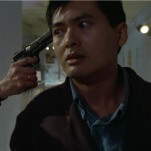Critics weren’t especially kind to Bright, Netflix’s big 2017 push to brand itself as a real, bona fide movie studio, complete with an awful, David Ayer-directed Will Smith blockbuster of its very own. Working from a script from Max Landis, Ayer managed to make a movie that pretty much nobody in the critical sphere enjoyed, a confused mash-up of Tolkien-esque fantasy and the director’s own Training Day, with orcish street gangs, elven mobsters, and corrupt cops all battling it out for control of a WMD-esque magic wand.
Of course, that critical drubbing wasn’t enough to get people to actually avoid watching the film—to the tune of roughly 11 million viewers, according to Netflix—something that star Joel Edgerton noted in a brief defense of the movie earlier this week. Speaking during a promo tour for Red Sparrow, Edgerton contended that despite its negative reviews, Bright’s release strategy made it functionally critic-proof—and suggested that that immunity to judgment might have fueled some of the editorial hate directed against it from the “highbrow,” orc-hating literati:
I think there was a little bit of extra critical hate towards it because it’s changing the landscape of the movie business, but I think Bright is maybe a movie that needs to be reviewed by public opinion rather than viewed through the highbrow prism of film criticism.
As Edgerton himself notes, Bright is functionally free for Netflix subscribers to watch, costing only 117 minutes of their time, along with the slow, hopeless feeling of realizing that Will Smith, like all of us, will die some day. That might explain why it did so well in the court of “public opinion,” even if said opinion was “Fuck it, I can’t be bothered to scroll past the first page of Netflix offerings tonight, so we might as well watch Bright.”
[via ScreenCrush]







































